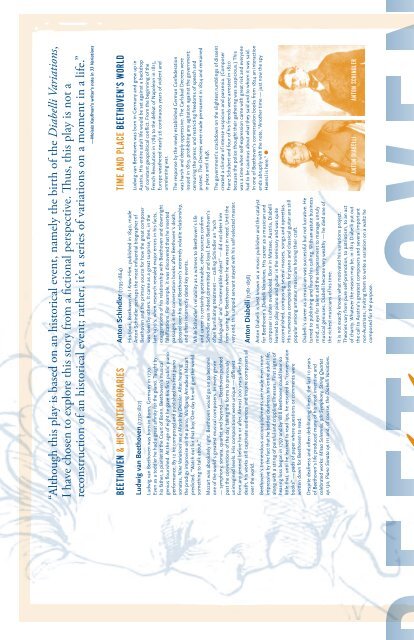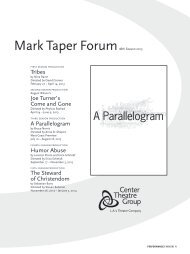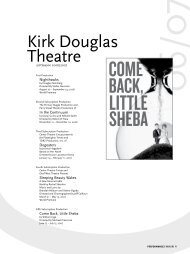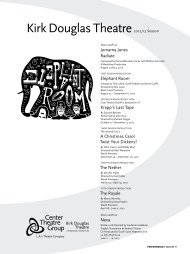33 Variations - Center Theatre Group
33 Variations - Center Theatre Group
33 Variations - Center Theatre Group
Create successful ePaper yourself
Turn your PDF publications into a flip-book with our unique Google optimized e-Paper software.
“Although this play is based on an historical event, namely the birth of the Diabelli <strong>Variations</strong>,<br />
I have chosen to explore this story from a fictional perspective. Thus, this play is not a<br />
reconstruction of an historical event; rather, it’s a series of variations on a moment in a life.”<br />
—Moisés Kaufman’s writer’s note in <strong>33</strong> <strong>Variations</strong><br />
time and plaCe Beethoven’s World<br />
Anton Schindler (1795-1864)<br />
Beethoven & his Contemporaries<br />
Ludwig van Beethoven was born in Germany and grew up in<br />
Austria. His entire adult life would be set against a backdrop<br />
of constant geopolitical conflict. From the beginning of the<br />
French Revolution in 1789 to the defeat of Napoleon in 1815,<br />
Europe weathered nearly 26 continuous years of violent and<br />
unrelenting war.<br />
His book, Beethoven As I Knew Him, published in 1840, made<br />
Anton Schindler perhaps the most influential biographer of<br />
Beethoven and the primary source for how the great composer<br />
was seen by others. It came as a great surprise, then, in the<br />
late 1970’s, when research revealed major errors in his facts,<br />
exaggerations of his relationship with Beethoven and downright<br />
falsifications. For example, it was discovered that he inserted<br />
passages in the conversation books after Beethoven’s death,<br />
glossed over his and Beethoven’s extremely volatile relationship,<br />
and often incorrectly dated key events.<br />
Ludwig van Beethoven (1770-1827)<br />
The response by the newly established German Confederation<br />
was harsh and deeply oppressive. The Carlsbad Decrees were<br />
issued in 1819, prohibiting any agitation against the government;<br />
censuring the press; and restricting freedoms of speech and<br />
protest. The Decrees were made permanent in 1824 and remained<br />
in place until 1848.<br />
Ludwig van Beethoven was born in Bonn, Germany in 1770.<br />
Even as a toddler he had a great affinity for the piano. Taught by<br />
his father, a pianist at the Court of Bonn, Beethoven’s musical<br />
genius flourished. At the age of eight he gave his first public piano<br />
performance. By 12 he composed and published his first piano<br />
sonatas, Nine <strong>Variations</strong> on a March by Dressler. After hearing<br />
the prodigy improvise on the piano, Wolfgang Amadeus Mozart<br />
predicted, “Watch out for that boy. One day he will give the world<br />
something to talk about.”<br />
The government’s crackdown on the slightest rumblings of dissent<br />
created a climate of intense suspicion and paranoia. (Composer<br />
Franz Schubert and four of his friends were arrested in 1820<br />
because the police thought their gathering was suspicious.) This<br />
was a time when self-expression came with great risk and everyone<br />
had to be cautious about what they said and to whom it was said.<br />
In one of Beethoven’s conversation books from 1824 an interaction<br />
ends abruptly with the note, “Another time — just now the spy<br />
Haensl is here.” ●<br />
While Schindler’s reliability as a witness to Beethoven’s life<br />
and career is certainly questionable, other sources confirm<br />
Schindler was indeed committed and loyal. Even Beethoven’s<br />
often humiliating treatment — calling Schindler an “arch<br />
blackguard” and “contemptible object” — did not deter him<br />
from caring for Beethoven when he was most in need. until the<br />
very end, this unpaid servant stayed with his self-selected master.<br />
Anton Diabelli (1781-1858)<br />
Mozart was absolutely right. Beethoven would go on to become<br />
one of the world’s greatest musical composers. In every genre<br />
— symphony, sonata, quartet and beyond — Beethoven pushed<br />
past the conventions of the day, taking the forms to previously<br />
unimagined levels. His compositions were unique — different<br />
from any penned before him or after. Almost 200 years after his<br />
death, his works still captivate audiences and inspire composers all<br />
over the world.<br />
Anton Diabelli is best known as a music publisher and the catalyst<br />
for Beethoven’s Diabelli <strong>Variations</strong>. His career as a musician and<br />
composer is often overlooked. Born in Mattsee, Austria, Diabelli<br />
learned to play piano and guitar in the seminary and was quite<br />
accomplished, composing several masses, songs and operettas.<br />
His numerous compositions for piano and classical guitar are still<br />
popular among amateur musicians honing their craft.<br />
Beethoven’s tremendous accomplishments are made even more<br />
impressive by the fact that he battled deafness his entire adult life,<br />
along with a string of painful and crippling illnesses. First signs of<br />
hearing loss began in 1797 and by 1818 Beethoven could hear so<br />
little that, until he learned to read lips, he resorted to “conversation<br />
books” — pads of paper where questions or comments were<br />
written down for Beethoven to read.<br />
Diabelli’s career as a musician was successful but not lucrative. He<br />
turned to publishing and found his calling. With an astute business<br />
mind, an eye for talent and the temperament to manage unruly<br />
musical geniuses, Diabelli became very wealthy — he died one of<br />
the richest musicians of his time.<br />
Despite deafness and often debilitating illness, the last 10 years<br />
of Beethoven’s life produced many of his most inventive and<br />
celebrated works: Missa Solemnis, 9th Symphony, String Quartet<br />
op.130, Piano Sonata op.111 and, of course, the Diabelli <strong>Variations</strong>.<br />
Anton Schindler<br />
Anton diAbelli<br />
It is not exactly known what motivated his variations project.<br />
Theories vary from pure self-promotion, to patriotism, to an act<br />
of charity. Whatever the reason may be, in 1819 Diabelli put out<br />
the call to Austria’s greatest composers and several important<br />
non-Austrians, inviting them to write a variation on a waltz he<br />
composed for the purpose.













